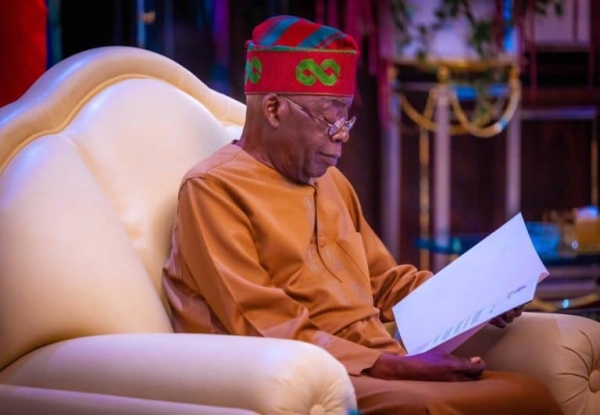President Tinubu should reconsider tax on electronic money transfer
Nigerians woke up to another shocking levy imposed by the federal government, the electronic money transfer levy imposed on customers of fintech platforms. The latest levy, a N50 charge on electronic transfers above N10,000, is already sparking outrage and frustration among citizens who already are struggling with multiple taxation, poverty, hunger and unemployment. The Electronic […]

tinubu 3
Nigerians woke up to another shocking levy imposed by the federal government, the electronic money transfer levy imposed on customers of fintech platforms.
The latest levy, a N50 charge on electronic transfers above N10,000, is already sparking outrage and frustration among citizens who already are struggling with multiple taxation, poverty, hunger and unemployment.
The Electronic Money Transfer Levy Regulations, 2022, introduced by the Finance Act, 2020 to be enforced by the Federal Inland Revenue Service (FIRS), starting from September 9th is another example of the government’s obsession with taxation.
The levy, which targets electronic transactions, will only exacerbate the suffering of Nigerians, who are already burdened by various taxes, fees, and levies.
- Tinubu trying, he inherited near-bankrupt nation – Tafawa-Balewa
- Bauchi: Senator Buba donates to flood victims, asks gov to act
Fintech companies like OPay, Moniepoint and PalmPay from 9th of September will start charging the N50 levy on transactions above N10,000, citing compliance with FIRS regulations.
The question remains: what has the government done to improve the lives of Nigerians? The answer is clear: nothing! Instead, the government continues to milk its citizens dry, imposing levies and taxes without providing basic services or infrastructure.
Tinubu’s government must understand that a thriving economy is built on the back of a prosperous people. To achieve this, the government must create an enabling environment for businesses to flourish. This includes supporting small and medium-scale enterprises through grants and loans, as well as investing in agriculture, production, and productivity. By doing so, the government can stimulate economic growth and create jobs, thereby improving the standard of living for Nigerians.
It is only when both the micro and macro economies are improved that the government can justify taxing its citizens. But as it stands, the government’s continued taxation of already overburdened citizens is nothing short of extortion.
The government must be sincere in its efforts to improve the lives of Nigerians. It’s time to stop paying lip service and take concrete actions. Everything is not politics; the welfare of the people should be the government’s top priority.
Only then can the government justify its existence and earn the trust and respect of its citizens. Until then, the people will continue to suffer, and the government’s credibility will continue to plummet.
It’s time for the government to rethink its priorities and focus on the welfare of its citizens. Enough is enough. Nigerians cannot continue to suffer under the weight of excessive taxation and poor governance, please do something!
Dayo DaSilva (arpa, amncs) wrote from Ogun State and can be reached via [email protected]
